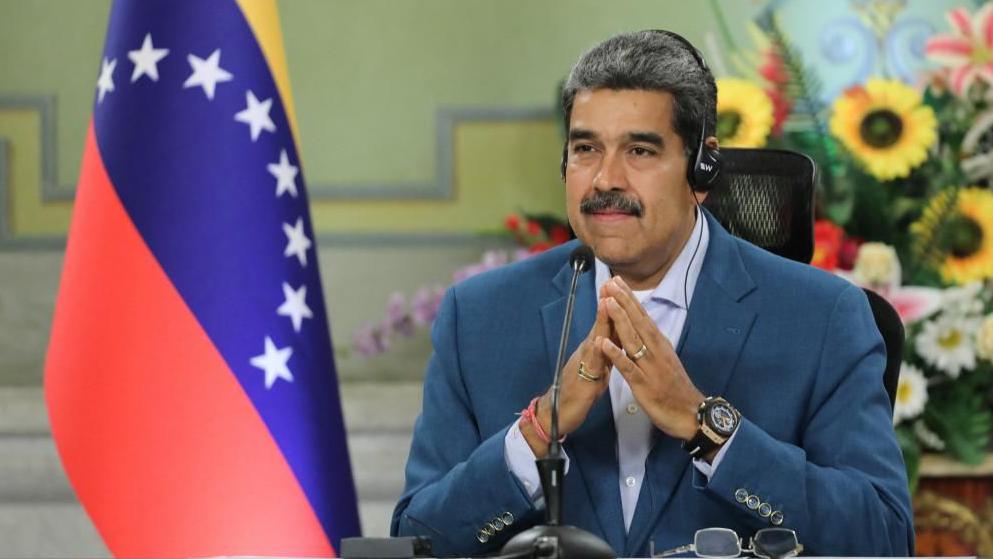US to sanction Maduro-aligned officials, to put pressure on Venezuela’s president to accept election results

Nicolás Maduro maintains he has been re-elected to a third term, but the opposition says it has evidence showing it won the election
The United States has announced new sanctions targeting more than 20 officials connected to Venezuela’s President Nicolás Maduro, aiming to pressure him to recognize the results of the country’s controversial July presidential election. The sanctions, revealed on Wednesday, are part of a broader US effort to push for a democratic transition in Venezuela and encourage officials within Maduro’s government to break ranks.
Thursday marks exactly four months since the July 28 election, which was widely disputed both domestically and internationally. The US government’s goal with these sanctions is to increase pressure on Maduro’s inner circle, compelling them to acknowledge the election’s results and create an environment for democratic change in the country.
Among those sanctioned are military and security officials from various sectors, including the Bolivarian National Guard and the Bolivarian National Police. Notable individuals affected by the sanctions include Aníbal Coronado, Maduro’s newly-appointed chief of staff, Freddy Ñañez, the Minister of Communication, and Alexis Rodriguez, the director of Venezuela’s intelligence services. These sanctions come amid ongoing criticism of the Venezuelan government’s actions, including accusations of political repression and undemocratic practices.
The US has already imposed extensive sanctions on Venezuela’s oil industry, which is a key part of the country’s economy. Sanctions targeting the oil sector, including general licenses for certain US companies like Chevron to operate in Venezuela, are still in place and will continue to be “constantly reviewed,” according to senior US officials.
This new round of sanctions follows a recent move by the US to formally recognize Venezuelan opposition leader Edmundo González as the legitimate president-elect of Venezuela. Secretary of State Antony Blinken announced this recognition on X (formerly Twitter), following the disputed election. Despite the official results from Venezuela’s National Electoral Council (CNE), which declared Maduro the winner, opposition leaders and many international observers, including the US, have rejected the outcome, citing irregularities and claims of electoral fraud.
Blinken stressed the importance of respecting the will of the Venezuelan people, saying, “The Venezuelan people spoke resoundingly on July 28 and made Edmundo González the president-elect. Democracy demands respect for the will of the voters.”
The sanctions are seen as part of the US’s broader strategy to support democratic forces within Venezuela while holding the Maduro regime accountable for its actions, which include widespread political repression and the undermining of the country’s democratic institutions. The US has long criticized Maduro’s rule, and the Biden administration’s actions reflect a continuation of its efforts to challenge the authoritarian government.
In addition to individual sanctions, the US has used other diplomatic tools to press for change in Venezuela, including direct engagement with opposition leaders and international bodies. The US government has made it clear that it will continue to hold Maduro’s government accountable, while also supporting efforts for a peaceful and democratic transition in Venezuela.
However, the US government also acknowledges that the situation is fluid, especially with the upcoming change in US leadership. The new administration set to take office in January 2025 will have the opportunity to take up the issue of Venezuela, with one official noting that “a new administration can take up this issue with Venezuela” once President-elect Donald Trump assumes office. For now, the Biden administration is continuing its push for democracy and human rights in Venezuela.
Sanctions on Venezuela are not a new phenomenon. Since 2017, when the country’s economic crisis escalated, numerous Venezuelan officials, including high-ranking members of Maduro’s government, have been sanctioned by the US Department of the Treasury. Maduro himself has been on the US sanctions list since 2017, with the US Department of Justice formally charging him in 2020 for drug trafficking and terrorism-related crimes. The US is offering a reward of up to $15 million for information leading to his arrest or conviction.
Despite these sanctions and ongoing international pressure, Maduro remains in power, and his government has continued to resist efforts to bring about democratic reforms. In the face of these challenges, the US has signaled its intent to continue applying pressure, through both sanctions and diplomatic measures, as part of a larger strategy to promote democracy and accountability in Venezuela.
The situation in Venezuela remains complex, with Maduro’s government tightly controlling the political landscape. However, the US’s latest actions underscore its commitment to supporting the Venezuelan people in their pursuit of democracy and the rule of law, while holding the Maduro regime accountable for its actions.






